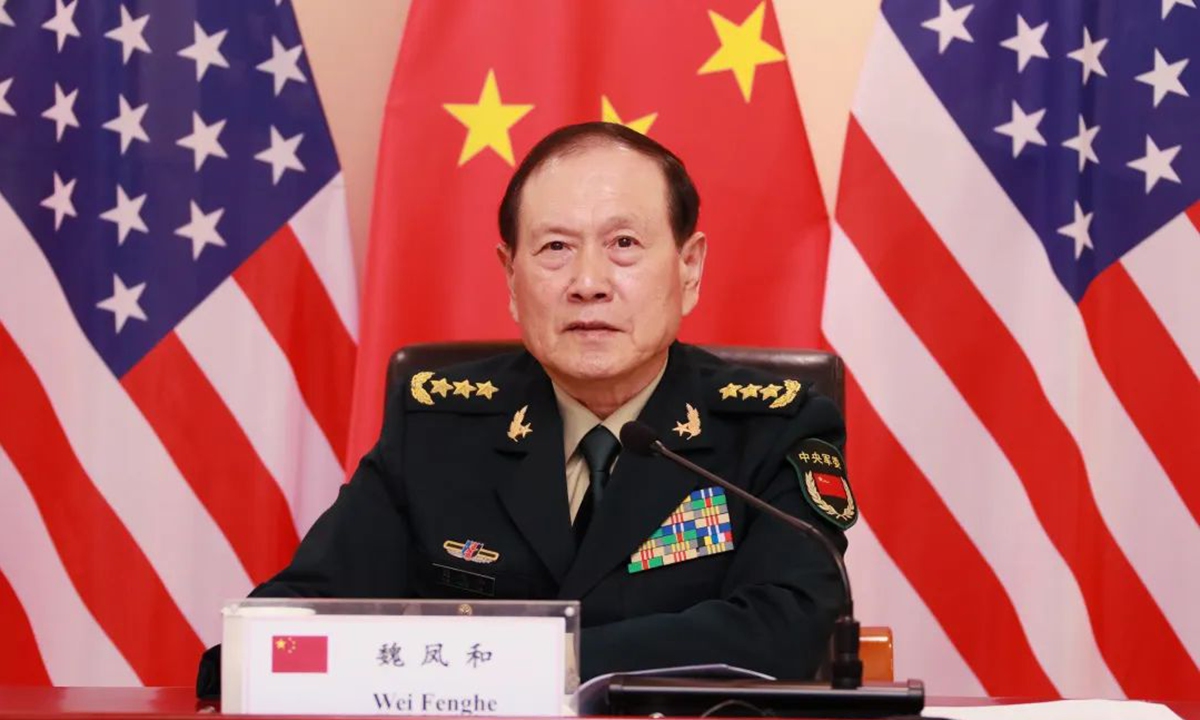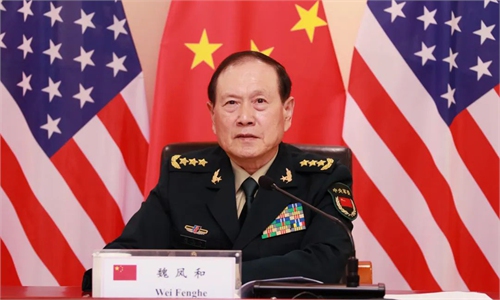
Chinese State Councilor and Defense Minister Wei Fenghe
Chinese State Councilor and Defense Minister Wei Fenghe held a telephone talk on Wednesday with US Secretary of Defense Lloyd Austin. This is the first phone call between Chinese and US defense chiefs since US President Joe Biden took office, which highlights the difficulties and complexity in the current bilateral ties, including the relations between the two militaries, and has certain particularity and importance. Against the backdrop of a turbulent international situation and continuous tensions between China and the US, the communication between the two defense ministers sent a positive signal to the outside world.During the call, both Wei and Austin expressed their willingness to advance the implementation of the consensus reached by the two heads of state, as well as their desire to manage risks. Wei stated China's solemn position on the Taiwan question and demanded that the US stop military provocations at sea. Austin said that the US adheres to the one-China policy and will strengthen military exchanges and cooperation with China in a candid and open manner.
The two sides also exchanged views on issues such as maritime and air security and the situation in Ukraine, continuing the consistent, frank style of high-level China-US dialogues when facing differences. The high-level communication between both militaries will help avoid misjudgments and create favorable conditions for the return to a stable development of military relations.
Needless to say, the risk of a military accident and even an outbreak of armed conflict between the Chinese and US forces is increasing, which has aroused growing concerns in the international community. The Chinese and US militaries have had a relatively stable period in the past decade or so. However, during the later period of the Trump administration, as Washington unscrupulously launched all-round provocations against China, military exchanges between the two countries fell into low ebb. The real risk of military mishaps is greatly increased. This situation continues to this day.
The responsibility for such a perilous state today lies entirely with the US. The Biden administration made it clear that it does not seek confrontation with China. Nonetheless, provocations from the US military kept increasing. In particular, the military collusion between the US and the island of Taiwan has become increasingly rampant.
Washington is stepping up its arms sales to Taiwan island. The two sides have also greatly increased "military exchanges" aimed at improving "joint combat capabilities." In addition, in recent years, US congressmen have visited Taiwan many times with the assistance of the military, roaming around the red line with "US military planes landing in Taiwan." The US aircraft carriers passed through the Taiwan Straits under the banner of "freedom of navigation." These dangerous acts of repeatedly testing the mainland's red line have greatly pushed up the real risks of a war in the Taiwan Straits.
The US has carried out close-in reconnaissance on China in the South China Sea, East China Sea, the Yellow Sea and other regions, which has also ramped up the risk of accidents. According to statistics, in 2021, there were about 4,000 to 5,000 close-in reconnaissance sorties of various US military aircraft over China and about five warships a day operating in the South China Sea, East China Sea, or the Yellow Sea. Because of the increasing frequency, the US military has already been in a state of excessive deployment and overfatigue in the West Pacific, resulting in a decline in professionalism of front-line officers and soldiers. Recent frequent incidents of US warships and planes in the South China Sea are proof of it. This situation also means that the risk of friction between the US and the Chinese militaries is rapidly rising and it is urgent that risks are controlled.
This time, China spoke to the US at the invitation of the Americans, which demonstrates that Washington is also aware of the seriousness of the problem. Dialogue is better than no talk and engagement is better than confrontation, but what is more important is that the US should show its sincerity to implement its promise to avoid a new Cold War with China, to not change China's system or revitalize alliances against China, and that the US does not support "Taiwan independence" or intend to seek a conflict with China. The defense ministers of the two countries have emphasized "controlling the crisis." Washington, as the side that provoked conflicts and created the crisis, should of course take the initiative to win the trust of China.
If the US military truly does not want to have clashes with the PLA, it should stop militarily provoking China and keep away from China's doorstep. Especially on the Taiwan question, Washington should understand that China does not have the slightest room for compromise and the Chinese army will firmly safeguard the country's security of sovereignty and territorial integrity. The US should clearly receive this signal and refrain from misinterpreting, misunderstanding and misjudging this position.
We have also noticed that some in the US have increased their urge to take chances as they have exploited the conflict between Russia and Ukraine. They even thought that the US could provoke a conflict in Asia-Pacific or the Taiwan Straits and then retreat without losses. We hope that this kind of madness will not erode the already scarce rational elements in America's perception of China. Cooperation between China and the US will benefit both, while confrontation will hurt. This is not a casual slogan but a fact. Now that the US secretary of defense has expressed his willingness to "manage risks," it is time for Washington to take concrete actions to prove its credibility.

